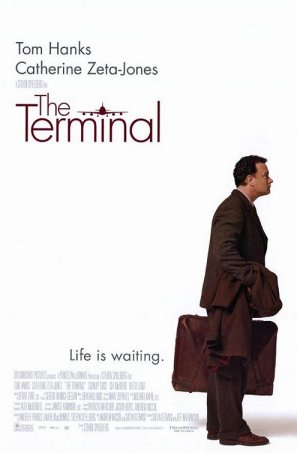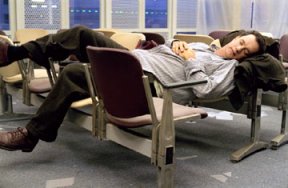|
The
Terminal
Once upon a time, in a far away land called
New York, a charming little story unfolded about a man without
a country who wanted to visit America. In the real world,
the story wasn't so charming, as it involved political upheaval
in his homeland, and mass slaughters always take the bloom
off of cute fables. Then bureaucrats have to get involved
in this sort of thing, and they're not so much evil as just
annoying. That, too, makes it hard to keep things light.
So Steven Spielberg, a director that once
knew how to gloss over such things but has now become a
serious important director, can't quite make The
Terminal work. Seriously, twenty years ago when he cared
more about entertaining the crowd than teaching them a lesson,
this movie would have glowed.
But twenty years ago, Spielberg might not
have been able to have Tom Hanks and Catherine Zeta-Jones.
They were around, but nobody lined up to see them.
Thankfully for The Terminal, people
line up to see them now, and they work hard to redeem some
grim direction and quite honestly sloppy nonsensical story
editing.
At its heart, the film has an interesting
story, and it's loosely based in a real-life event. Viktor
Navorski (Hanks) arrives at LaGuardia Airport from the fictional
country of Krakozia, only to find his passport unacceptable.
It seems that while he was in the air, his country suffered
a bloody government coup, and to the United States, Krakozia
may now be history. Stuck as a man without a country, Hanks
cannot return home, but neither can he actually leave the
airport terminal and enter New York City.
The airport officials, now associated with
the Department of Homeland Security (strangely treated as
if this is the way it has always been - forgive the thoughtcrime),
actually hope that this isolated visitor will just break
the law and escape. Then he will be someone else's headache.
Unfortunately for them, he respects their authority, and
makes the airport his home.
What
follows is an uneasy mixture. At times, it's fascinating
to see how he survives, creating a living space in an area
of the terminal closed for renovation. (As an afterthought,
the script makes him a building contractor in Krakozia,
and he's also better and more industrious than the crew
actually working on the terminal.)
But
there are also scenes in which his cleverness seems like
part of a psychological experiment on a monkey, with the
security guards watching him on their screens and marveling
at how he's worked out how to get a little money.
If there is any condescension toward this
stranger in a strange land, it does not come from Hanks.
With almost any other actor, this role would seem like Oscar-baiting.
Surely, he jumped at the chance to demonstrate a facility
for a vaguely Russian accent. But what carries him through
is his expressiveness as an actor. What happens to the character
sometimes feels forced, but Hanks can make us believe it
with a look, especially since for at least half the movie
his English cannot even qualify as fractured.
Too
much of the movie, though, feels forced because Spielberg
keeps undercutting his ability to charm us. As with Catch
Me If You Can, you're seeing a director fight his
instincts, forgetting that if you build a story right, no
matter how improbable, we want to see more. So a
cute side romance between a food worker and an immigration
officer isn't just on the side; it's practically invisible,
so we're jumping from an awkward courtship with Hanks in
the middle to a wedding. But Spielberg seems so unsure of
its value that we can't feel anything for it, yet there's
a dynamite throwaway "reveal" scene that proves that dangit,
this guy can direct.
The two sides to the director struggle
too hard. For every scene that charms us, he has to counterbalance
with one that makes a dubious political point. We almost
see what a great place America is, or can be, but he cannot
resist reminding us that it's also full of assholes. Hey,
we can get that easily outside of the theater, Steven.
Trapped in this dichotomy is Zeta-Jones.
Conversely, she gives one of the strongest performances
of her career, precisely because it's so gentle. As the
love interest Amelia, she plays a flight attendant facing
fears about age and loneliness. Stuck in a destructive relationship
with a powerful lawyer (Michael Nouri, an underutilized
actor), she bides her time with history books while waiting
for the page that says their affair can resume. This hard-edged
actress drops the veneer, becoming believably fragile and
vulnerable in a way her previous roles hardly hinted she
could do.
And then the serious director jumps in
and starts tearing down all the innocence and fairy-tale
nuance that the crowd-pleaser set up. It's hard to give
in and really like this movie, because we cannot trust it.
That applies even to the ending; it may be real, it may
be adequate, but it keeps us at a distance.
That's a mistake, because all the elements
are here for us to love. You can temper the sentiment, pull
it back from mawkishness, without building a wall between
it and the audience. For some reason, Spielberg has not
figured out how to do that yet.
Rating:

|








